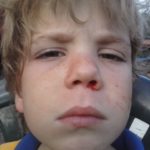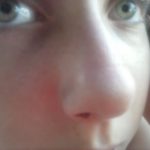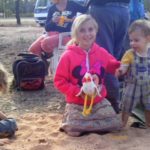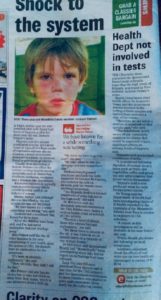Subcase 1 – Health
The human health subcase will examine the health impacts of fracking, both acute and chronic, especially for vulnerable groups – due to exposures to endocrine disruptors, known and probable carcinogens, radon gas, neuro- and developmental toxicants, ozone, and noise.
View and download a PDF version of this PowerPoint presentation here. [1MB]
Doctors for the Environment Australia (DEA) Testimony
We, Doctors for the Environment Australia and authors Dr Marion Carey and Dr David Shearman, submit the following report as our testimony to the Tribunal.
Our report demonstrates the unconventional gas impact on the fundamental human right to health and a healthy environment in a region of New South Wales Australia. The report demonstrates that good health is dependent on having clean air, clean water, a safe sustainable food supply and a stable climate and that there are serious threats to these determinants of health from unconventional gas development.
Dr Wayne Somerville Testimony
Dr Somerville has practiced clinical psychology specialising in trauma, in the Northern Rivers of New South Wales for 30 years. He has treated people who have symptoms of unconventional gasfield industrialisation and has had broad personal contact with people suffering similarly outside of the clinic.
Letter to Australia’s Chief Scientist refuting that there is no data to support concerns about the adverse impacts of unconventional gas mining, and their portrayal of decent, concerned citizens as irrational and unscientific.
Testimony by Dr Mariann Lloyd-Smith (Filmed by Cloudcatcher Media)
National Toxics Network (NTN) is a NGO (non-government organisation) network working for pollution reduction, protection of environmental health and environmental justice. Established in 1993, NTN is committed to a toxics free future. NTN’s Senior Advisor, Dr Mariann Lloyd-Smith trained as a negotiator in chemical disputes and has a PhD from Law Faculty, UTS Australia. She has campaigned in the area of chemicals policy and hazardous waste management for three decades working with NGOs, indigenous groups, national governments, UNEP and the OECD. Mariann participates in the technical working groups for Stockholm Convention on Persistent Organic Pollutants and focuses on community right to know. Dr Lloyd-Smith was a member of the UN Expert Group on Climate Change and Persistent Organic Pollutants, and an advisor to the OECD for their Fracking Summit.
Dr Geralyn McCarron Testimony (filmed by Cloudcatcher Media)
Dr Geralyn McCarron is a GP who practices in Brisbane. Her primary medical degrees are from the Queens University of Belfast in Northern Ireland; she is a Fellow of the Royal Australian College of General Practitioners, and member of the National Toxics Networks, Doctors for the Environment Australia, and the Australian Medical Association. Dr McCarron has spent more than five years on the ground with, and intimately involved in, the experiences of those living in the gasfields of Australia, which places her in a unique position among her peers and certainly well respected by the impacted communities. This experience has led Dr McCarron to provide testimony both nationally and internationally regarding the health impacts of the industry and most recently authoring and publishing a peer reviewed paper based on health and industry pollution data from the Queensland Darling Downs region. Dr McCarron provides the following video and attachments as her Testimony to the Tribunal.
Dr Geralyn McCarron – The impact of unconventional gas on the human right to health from Cloudcatcher Media on Vimeo.
Attachment 1: Paper: Air Pollution and human health hazards: a compilation of air toxins acknowledged by the gas industry in Queensland’s Darling Downs
Attachment 2: Body of submission to the NT Fracking Inquiry
Attachment 3: comments submitted as response to Justice Pepper (Chair of NT Fracking Inquiry) Interim Report
Attachment 4: Submission to WDRC regarding the approval of a frac sand mine in rural residential area
Example of the government obstructing participation of the public – Streamlining Mines Legislation
Wendy Klason Testimony – Risks associated with Unconventional Gas Exploration, and the consequences of nondisclosure of risks for families and the Land.
Louise Somerville Testimony
Dear Tribunal,
In 2012 I witnessed for the first time in my life bleeding noses, coughs, listlessness and feelings of despair in small children “living” in a gasfield on the Tara Estate, Queensland. It absolutely shocked me! As a mother my heart went out to their parents who worried 24 hours a day about how they could relocate their children to escape the poisons their small bodies were constantly subjected to.
At first I thought that surely someone or some health authority must be onto the situation and action would be in hand. 6 long years later and children are still trapped and surrounded by toxic levels of land, air and water pollution!
Please act now to investigate and help the families who cannot afford to escape. This industry is spreading west of Brisbane and leaving uninhabitable wastelands. It’s not the Australia we wish to leave our future unborn generations.
Child 1 (NP)
Nosebleeds, headaches, listlessness in 2014
 Child 2 (JP) 2014
Child 2 (JP) 2014
 Child 3 (SP) 2014
Child 3 (SP) 2014
After a constant burning sensation in her nose all day then this rash developed.

A photo I took of J,S, N in August 2012 on the day that I first met them. Both little boys had nosebleeds erupt in front of our eyes and S had a dry cough.

Newspaper Article 6/1/2013
Newspaper Clipping

Testimony Name Provided
“In 2016 I visited farming family friends in the Chinchilla area. They have CSG wells on their property and they took me and a few others to see one of them. Within minutes of getting out of the vehicle I began to feel dizzy and nauseous. We stayed at this site for about 20 minutes by which time I had a pounding headache. It was at least an hour before the dizziness and nausea began to wear off but the headache persisted until I went to bed.
There is a CSG well directly opposite my friends’ home. My heart still breaks for them, knowing that they have no choice but to live with toxic pollution and unwanted noise which regularly makes them ill.”
